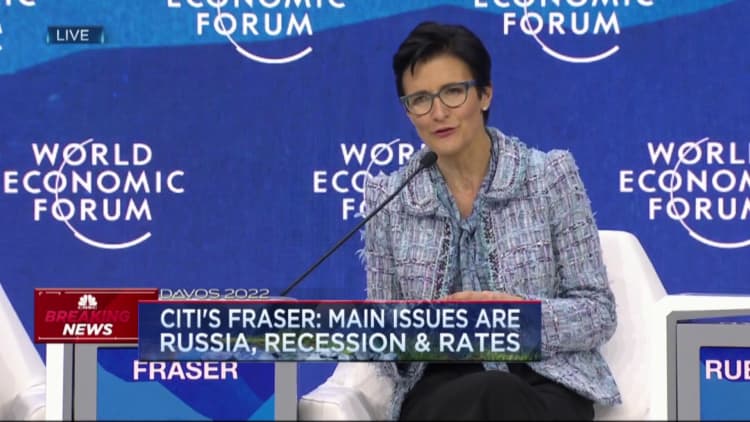George Soros, billionaire and founder of Soros Fund Management, at the World Economic Forum in Davos, Switzerland, in Jan. 2016.
Matthew Lloyd | Bloomberg | Getty Images
The World Economic Forum in Davos, Switzerland, kicks off next week. It’s an annual meeting where a global elite of business leaders, politicians and economists make bold predictions and try to set the agenda for the year ahead — but they don’t always get it right.
Here’s a recap of some calls made in recent years.
European recession
The fate of Europe’s economy was a big concern at May’s 2022 WEF annual meeting, in the wake of Russia’s invasion of Ukraine.
Citigroup CEO Jane Fraser said at a panel, “I think much more concerning for Europe, that is right in the middle of the storms from supply chains, from energy crisis, and just the proximity to some of the atrocities that are occurring in Ukraine.”
When asked whether there would be a recession in Europe, Fraser gave a definitive answer: “Yes — and I hope I’m wrong.”
Though the region’s growth rate has taken a hit and inflation has surged, the EU has so far escaped a recession. A number of analysts predict there will be one in early 2023, but expect it to be “mild.” Berenberg, for example, expects GDP (gross domestic product) to fall by 0.1% in the euro zone this year.
But Goldman Sachs has improved its outlook on the region, saying this week it no longer forecasts a recession for the euro area.
“We maintain our view that euro area growth will be weak over the winter months given the energy crisis but no longer look for a technical recession. This reflects more resilient growth momentum at the end of last year, sharply lower natural gas prices and earlier China reopening,” Goldman analysts said in the note.
They pointed to a GDP growth rate of 0.6% for 2023, compared to consensus expectations for a 0.1% contraction.
Nuclear war
Billionaire investor George Soros warned during a speech at Davos in 2018 that the United States could be heading for a nuclear war with North Korea.
“The United States is set on a course towards nuclear war by refusing to accept that [North] Korea has become a nuclear power,” he said at the time.
The Obama administration also said back in 2016 that this was a top national security risk.
So far, the United States has avoided any military conflict with North Korea. In fact, recent concerns along these lines are focussed on Russia, in the wake of its invasion of Ukraine.
FTX crash
Cryptocurrency was rocky throughout 2022, but…
Click Here to Read the Full Original Article at Top News and Analysis (pro)…


